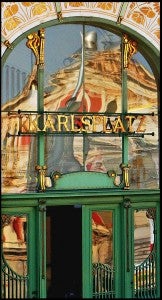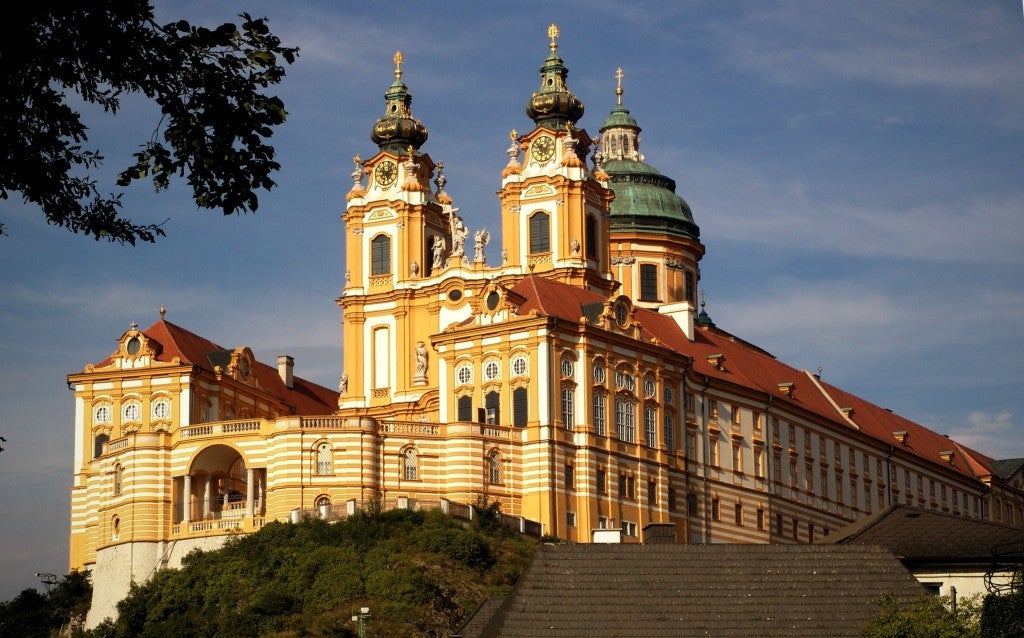Vienna, on e of Europe’s great imperial capitals, is our classroom. Vienna was the scene of epic battles between Christians and Muslims, as Ottoman Turks besieged the city. Religion and politics intersected in the formation of the Habsburg Empire. We explore religious art of the sixteenth century and retrace seventeenth-century pilgrimages to sacred shrines and saints’ relics to understand Protestant and Catholic spirituality. We visit Baroque and Rococo palace
e of Europe’s great imperial capitals, is our classroom. Vienna was the scene of epic battles between Christians and Muslims, as Ottoman Turks besieged the city. Religion and politics intersected in the formation of the Habsburg Empire. We explore religious art of the sixteenth century and retrace seventeenth-century pilgrimages to sacred shrines and saints’ relics to understand Protestant and Catholic spirituality. We visit Baroque and Rococo palace s where Austrian imperial ambitions were reflected in architecture and interior design. A musical capital, Vienna was home to Mozart, Beethoven, Haydn, Schubert, and many others. In fact, more classical composers lived in Vienna that in any other city. We experience classic coffeehouse culture as centers of enlightened sociability, fin-de-siècle intellectual life, and political culture–Leon Trotzky and Vladimir Lenin were regulars at Café Central. We trace the emergence of modernism and modernity in the cosmopolitan multi-ethnic metropolis around 1900, in the works of Freud, Klimt, Schnitzler, and Wittgenstein among others.
s where Austrian imperial ambitions were reflected in architecture and interior design. A musical capital, Vienna was home to Mozart, Beethoven, Haydn, Schubert, and many others. In fact, more classical composers lived in Vienna that in any other city. We experience classic coffeehouse culture as centers of enlightened sociability, fin-de-siècle intellectual life, and political culture–Leon Trotzky and Vladimir Lenin were regulars at Café Central. We trace the emergence of modernism and modernity in the cosmopolitan multi-ethnic metropolis around 1900, in the works of Freud, Klimt, Schnitzler, and Wittgenstein among others.
With the collapse of the Habsburg Empire after World War I and the emergence of the Austrian Republic, we turn to the rise of National Socialism, with a particular focus on Adolf Hitler’s time in Vienna. We reconstruct the experience of Viennese Jews through the memoirs of Ruth Klüger, who was deported from Vienna to Auschwitz as a young girl. We visit Mauthausen, Austria’s most notorious death camp, where Simon Wiesenthal was freed by American forces in 1945. After the end of allied occupation, Vienna, officially “neutral,” became a center of international diplomacy during the cold war and beyond, serving as a headquarters to the United Nations, the International Atomic Energy Agency (IAEA ), and many other international organizations. With the collapse of the Soviet Empire, Vienna has become a new gateway to Eastern Europe.
The program takes an interdisciplinary approach, so that it is relevant to students in German, comparative literature, art history, architecture, urban design, landscape architecture, music and musicology, philosophy, psychology, religious studies, Jewish studies, film studies, political science, and international relations, as well as history. The program is taught in English. Students earn eighteen units, or nineteen units with an optional internship. After running this program as a Summer Abroad program for thirteen years, we are transforming it into a Quarter Abroad Program. Contact Professor Kathy Stuart with any questions. (Timing dependent on developments in the COVID 19 pandemic.) Program dates: August 1-31, 2024.